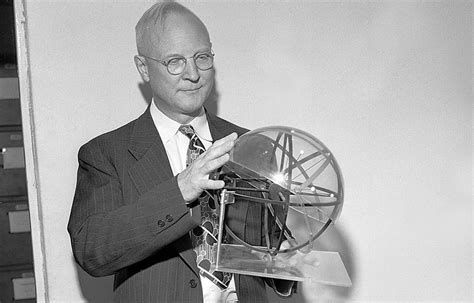A Quote by Albert Einstein
It seems to me that the idea of a personal God is an anthropological concept which I cannot take seriously. I also cannot imagine some will or goal outside the human sphere... Science has been charged with undermining morality, but the charge is unjust. A man's ethical behavior should be based effectually on sympathy, education, and social ties and needs; no religious basis is necessary. Man would indeed be in a poor way if he had to be restrained by fear of punishment and hope of reward after death.
Quote Topics
After
After Death
Also
Based
Basis
Been
Behavior
Cannot
Charge
Charged
Concept
Death
Education
Ethical
Ethical Behavior
Fear
Goal
God
Had
Hope
Human
Idea
Imagine
Indeed
Man
Me
Morality
Necessary
Needs
Outside
Personal
Poor
Punishment
Religious
Restrained
Reward
Science
Seems
Seriously
Should
Social
Some
Sphere
Sympathy
Take
Ties
Undermining
Unjust
Way
Which
Will
Would
Related Quotes
It seems to me that the idea of a personal God is an anthropological concept which I cannot take seriously. I feel also not able to imagine some will or goal outside the human sphere. My views are near those of Spinoza: admiration for the beauty of and belief in the logical simplicity of the order which we can grasp humbly and only imperfectly. I believe that we have to content ourselves with our imperfect knowledge and understanding and treat values and moral obligations as a purely human problem-the most important of all human problems.
The Creation speaks a universal language, independent of human speech or human language, multiplied and various as they be. It is an ever-existing original, which every man can read. It cannot be forged; it cannot be counterfeited; it cannot be lost; it cannot be altered; it cannot be suppressed. It does not depend upon the will of man whether it shall be published or not; it publishes itself from one end of the earth to the other. It preaches to all nations and to all worlds; and this Word of God reveals to man all that is necessary for man to know of God.
There is nothing divine about morality; it is a purely human affair. If people are good only because they fear punishment, and hope for reward, then we are a sorry lot indeed. What the individual can do is to give a fine example, and to have the courage to uphold ethical values .. in a society of cynics.
I do not believe that a man should be restrained in his daily actions by being afraid of punishment after death or that he should do things only because in this way he will be rewarded after he dies. This does not make sense. The proper guidance during the life of a man should be the weight that he puts upon ethics and the amount of consideration that he has for others.
When all has been considered, it seems to me to be the irresistible intuition that infinite punishment for finite sin would be unjust, and therefore wrong. We feel that even weak and erring Man would shrink from such an act. And we cannot conceive of God as acting on a lower standard of right and wrong.
Psychology should be the chief basic science upon which the practices of education depend. It should have supplied education with the information it needs concerning the processes of understanding, learning, and thinking, among other things. One of the difficulties has been that such theory as has been developed has been based primarily upon studies of behavior of rats and pigeons. As someone has said, some of the theory thus developed has been an insult even to the rat.
The civil magistrate cannot function without some ethical guidance, without some standard of good and evil. If that standard is not to be the revealed law of God (which, we must note, was addressed specifically to perennial problems in political morality), then what will it be? In some form or expression it will have to be the law of man (or men) — the standard of self-law or autonomy.
It seems to me that the earth belongs to God who made it and entrusted it to men as a perpetual home. But it cannot have been part of His plan that some men should be ill with overfeeding and that others should die of starvation. No matter what anyone can say they cannot prevent me from feeling sad and angry when I see a beggar crying at a rich man's door.
Due to his own original special nature, the Jew cannot possess a religious institution, if for no other reason because he lacks idealism in any form, and hence belief in a hereafter is absolutely foreign to him. And a religion in the Aryan sense cannot be imagined which lacks the conviction of survival after death in some form. Indeed, the Talmud is not a book to prepare a man for the hereafter, but only for a practical and profitable life in this world.






























